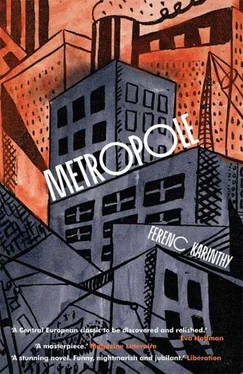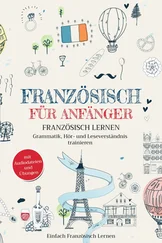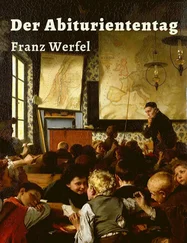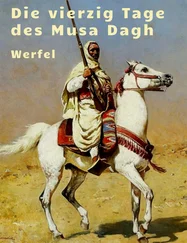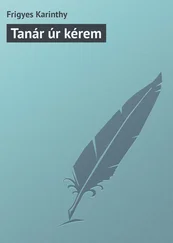Budai tore the page out and gave it to her along with the pencil to indicate that she should draw her own map. The woman misunderstood him, folded the sheet and put it in a metal box that she drew out from beneath the bed. He tried to discover her name as a beginning, then held up his fingers as if to count, one, two, three… But he could not be sure whether the overlong and slow answer she gave, giving an occasional bitter laugh, was in fact to his question. It was hard to know. She took her box out again, removing a number of miscellaneous items: buckles, brooches, ribbons, scraps of paper with writing on them, old letters, photographs, a pair of opera-glasses, a ring, some coloured marbles and a glass pearl. This must be where she kept her souvenirs and mementos. She closed then opened the box again and carried on talking in the deep hoarse voice:
‘ Tevebevedre atchipachitapp! Atchipachitapp?.. Buttureu jebetch atchichitapp? ’
She kept repeating the sound atchichitapp , as she picked out a child’s shoe from among her things, her eyes suddenly full of tears. Budai had no idea who the shoe belonged to, to the woman in her childhood? Or to a child of her own? And if she had a child where was it?… But she hugged the little shoe so passionately one couldn’t help but pity her: he stroked her hair, soft, red, electric, so it almost sparked as he touched it, caressing her brow and neck too. The woman caught his hand and put it to his face, to her mouth, smearing it with her tears: he felt awkward but he lost his coldness and was overcome by deep emotion. There was much annoyed shuffling and drumming in the waiting room, someone even knocked on the wall. Being hurried like that made Budai nervous and he would have disengaged himself but the girl wouldn’t let him, clinging to him, pressing his head into her lap, practically kneeling before him. He wanted to pull her up but found himself sinking down beside her instead and that was how they remained, clumsy, between floor and couch, in a most unnatural position but in a tight embrace, almost of one body.
People were shouting and banging outside: they really had to hurry now. The woman kissed him on the lips as if in farewell but that only made him sink down again… He turned away as he put on his coat, and after a moment of hesitation, awkwardly placed another ten-unit banknote on the chair. She wasn’t looking at him but was silently adjusting her hair in the mirror. Budai left by the back door, down side stairs that stank of cats.
The narrow street opened onto a square where a giant ferris wheel was turning and streams of many-coloured lights flashed over booths offering games, target shooting, dodgems, boat-swings, carousels, all the fun of the fair. There was an enormous illuminated roller-coaster; people were shrieking, shouting and trumpeting, small explosions were being set off. Everywhere the unceasing swirl of the crowd, no less dense, no less packed than elsewhere. There were slides, ghost trains, stalls with hoopla and ring-the-bell, conjurers, acrobats, sword-swallowers and fire-eaters, an Indian Rubber Man who could wind his legs around his neck and a two-ton woman who simply stood on a platform immobilised by her own weight, helpless and vast as a Polynesian idol.
There were boats for hire too if you were prepared to wait long enough though he no longer cared about time. Time didn’t matter any more: who cared what the clock said! He paid and was helped into a one-man punt. A slow current carried him down a barrel-vaulted, cave-like tunnel where music blared, some swaying barcarolle, and atmospheric coloured lanterns dangled either side, some even floating on the water. There were miniature castles and forts along the way, waterfalls, sluices, power stations, bridges and the rest; all the usual stuff, nothing special. For him though it was the greatest, most unexpected pleasure of the day, his first moment of pleasure since arriving.
Back home he used to canoe on the Danube. He’d start early in the morning and row a long way up the winding tree-and shrub-lined stream. The water never quite formed a smooth mirror as he proceeded between islands and sandbanks: it was constantly folding, trembling and sparkling, patches of dark billowing beneath the surface. Even on a windless day the river was alive and breathing. He usually tied the boat up on the same tiny unnamed island and took a rest: at high water it would be covered by the Danube, and later, once the water had retreated, the grass would remain exactly as it had been bent by the current, grass blades and the bases and branches of shrubs still tangled in wisps of water-weed but dry, as if the trees had grown beards. A narrow lagoon divided the islet into two, the water continuing to trickle through it. The little boat was easily maneouvrable and could be guided past bending branches and lianas that hid it from view. He never met anyone here, he disturbed a few birds at most. The current picked up where the lagoon ended, the river suddenly lurching into movement, clear and transparent right down to the pebbles at the bottom. This was where he best liked to bathe, the current carrying him, filling the pores of his skin, the water sweetish and soft on skin and tongue. One May morning he saw wild ducks by the sandy bank and observed them silently so they did not see him. The mother duck was teaching her brood to swim, dive and catch fish.
He set off back to the hotel in a light reverie full of happy memories. He had noted the name of the metro station he was aiming for, had even written it down, but just at the moment he didn’t know where he should get on. He was a long way from the station where he had arrived and was unlikely to find his way back to it, nor did he have any success in discovering another entrance with those characteristic yellow rails. He started asking around again in the hope that there might just be someone who understood him, stopping passers-by and pointing down at the paving. Finally a Tataric-looking woman in brown overalls seemed to grasp what he required and encouraged him to come with her, even taking his arm, and indeed, a mere two blocks on, she had succeeded in conducting him to the entrance of an underground public convenience.
By this time he feared he was permanently lost, no longer able even to find the hotel. It was getting late, close on midnight when he realised what he should do: he should watch the crowd and see where it was densest, see what direction it was moving in and note the main current. He located that current and tried to follow it, careful never to be parted from it. There were ever more people around him. Then they turned a corner into an even wider stream that a few hundred metres further on poured into a flat-roofed round building with steps leading down into the metro. Once there it was easy enough to find his way around: he could locate the map, seek out the relevant line on the correct level and note where he had to change trains.
He arrived in the little square from which he had started out that morning. The skyscraper he had been gazing at was still in construction. He counted the floors again to check: there were sixty-five though he clearly remembered there having been sixty-four before. He counted them twice more but it was sixty-five both times with the framework for the sixty-sixth already in place. They must have managed to finish a whole floor since he last looked… The fat doorman blinked, saluted and pushed open the swing door. Surely he was a robot, thought Budai, not human at all, a machine dressed in uniform programmed to perform two or three movements. He felt like tapping him to see what he was made of, though he immediately recoiled from the thought: he might get an electric shock…
Waiting for his key, he faintly recalled having left a letter at the desk addressed to the management. What if there were an answer waiting for him in the pigeon hole? Might they have returned his passport? There was nothing there. It was a different clerk again and he couldn’t be bothered with repeating the whole pointless charade. He took his key without a word and went to stand in the queue for the lift.
Читать дальше
